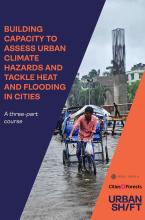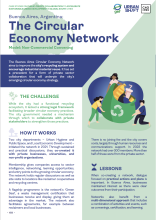Brief

Reducing Climate Impacts on Urban Sectors
This concise set of policy briefs provides an overview of climate adaptation actions cities can take within eight specific urban sectors, including energy, buildings, mobility, waste, and food systems.
In response to climate change, cities around the world are already implementing ambitious actions to reduce emissions (mitigation) alongside efforts to increase their climate resilience (adaptation) to protect citizens and infrastructure against current and future extreme weather events.
This series of policy briefs provides guidelines and examples of adaptation mechanisms to reduce climate change impacts in the urban sectors of clean energy, mass transit, new, municipal, and private buildings, waste and food systems, and active mobility. Each guide outlines the importance of integration within the relevant urban sector and includes example actions and case studies. These policy briefs were produced by C40 Cities.
Learn more
Clean Energy & Buildings Finance Academy
Hosted in Cape Town, this UrbanShift workshop brought together eight cities to discuss the promotion and financing of small-scale clean energy generation on public and private buildings.

Building Capacity to Assess Urban Climate Hazards and Tackle Heat and Flooding in Cities
These three interconnected courses are designed to build the capacity of city officials and urban practitioners to conduct vulnerability assessments.

Buenos Aires, Argentina: Circular Economy Network
Model: Non-Commercial Convening

UrbanShift at COP30
UrbanShift will be participating in a range of events during the Local Leaders Forum in Rio and COP30 in Belém. Learn more here.
